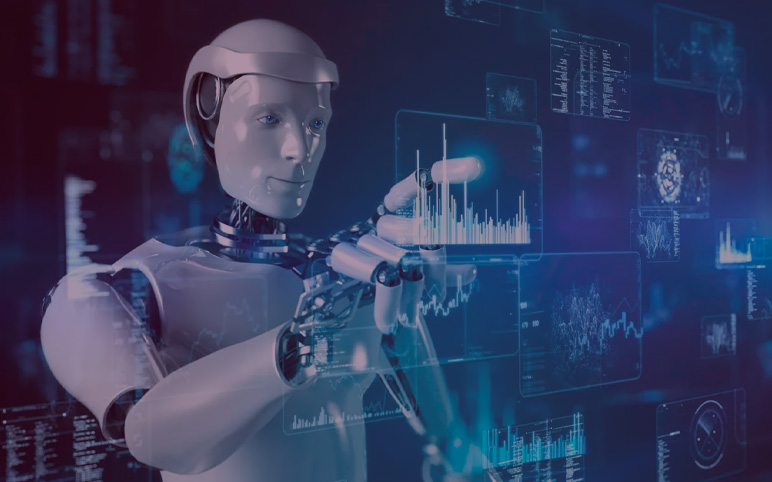In an era where technological innovation
shapes the very fabric of industries, the field of industrial automation stands
out, particularly through the integration of robotics. From their inception in
the mid-20th century to their advanced applications in the modern-day, robotics
in industrial automation have undergone a transformative journey, significantly
altering the landscape of manufacturing, healthcare, automotive sectors, and
beyond. This article aims to explore this journey, focusing on the
technological evolution, market trends, applications in various industries,
integration with other technologies, future predictions, and the associated
challenges and ethical considerations.
The history of robotics in industrial
automation is a testament to human ingenuity. From simple mechanical arms to
sophisticated AI-driven systems, the evolution of robotics has been marked by a
series of technological breakthroughs. These advancements have redefined
industrial capabilities, introducing levels of efficiency, precision, and
safety previously unattainable. For instance, the introduction of collaborative
robots (cobots) has enabled a synergistic workspace where humans and machines
operate in tandem, enhancing productivity and safety. In 2021 alone, the
deployment of cobots witnessed a 34% rise globally, indicating their growing
significance in modern industries.
Parallel to these technological
advancements, the global market for industrial robotics has seen exponential
growth. Valued at approximately $17 billion in 2023, the market is projected to
reach $42 billion by 2031, growing at a CAGR of 13.2%. This surge is attributed
to the increasing demand for automation across various sectors, driven by the
need for enhanced efficiency and reduced operational costs. In the automotive
sector, for example, robotics has revolutionized assembly lines. Over 50% of
robots deployed worldwide are in the automotive industry, streamlining
processes like painting, welding, and assembly.
Economic Impact
The economic implications of robotics in
industrial automation are far-reaching. While concerns regarding job
displacement exist, studies indicate a net positive impact on employment.
According to the World Economic Forum, robotics and automation could create 58
million new jobs by 2035. This paradigm shift is not about replacing humans but
rather augmenting human capabilities and fostering a more skilled workforce.
The integration of robotics in industries
like healthcare exemplifies their transformative impact. Robotic-assisted
surgeries have enhanced precision, reduced patient recovery time, and minimized
complications. The market for medical robots to reach $16.5 billion by 2028,
growing at a CAGR of 15.4%.
Technological Advancements and Their Impact
The synergy between robotics and
cutting-edge technologies like AI and the Internet of Things (IoT) is paving
the way for more autonomous and intelligent systems. AI-driven robots are
capable of learning, adapting, and making complex decisions, leading to more
efficient and responsive industrial processes. The global AI in robotics
market, valued at approximately $9.3 billion in 2022, is expected to grow to $77.6
billion by 2030. Similarly, the integration of IoT in robotics is enabling
real-time data analysis and remote monitoring.
Future Prospect
Looking towards the future, the industrial
robotics landscape brims with potential. Advancements like the integration of
virtual reality for robot training and remote control, and the development of
more advanced collaborative robots, promise to further reshape industrial
automation. However, the implementation of robotics is not without challenges.
High initial investment costs, technical complexities, and workforce adaptation
are significant hurdles. Moreover, the rise of robotics also brings forth ethical
considerations concerning privacy, data security, and the moral implications of
AI decisions. As industries increasingly adopt robotics, addressing these
challenges and ethical concerns becomes paramount.
How Astute Connect Can Help You?
In the rapidly evolving world of robotics
and industrial automation, staying ahead of the curve is critical for success.
Our expert network is an invaluable asset in this journey, offering direct
access to seasoned professionals and thought leaders in the field of robotics
and automation. This network empowers businesses and individuals to navigate
the complexities of this technology-driven landscape with confidence and
clarity.
Comprehensive Expertise in Robotics and Automation
Our network boasts a diverse pool of experts specializing in various aspects of robotics and industrial automation. From pioneering researchers in robotic technology to veterans in manufacturing automation, the network offers a wealth of knowledge. This diversity is crucial in an industry characterized by rapid technological advancements and interdisciplinary applications.
Customized Insights for Technological Challenges
The challenges in robotics and automation
are unique and often complex, requiring bespoke solutions. Our expert network
provides tailored advice, factoring in the specific needs and contexts of your
projects. Whether it's integrating AI into manufacturing processes or
optimizing supply chain automation, our experts deliver solutions that are both
practical and innovative.
Accelerating Decision-Making in a Dynamic Field
In the fast-paced world of industrial
robotics, timely decision-making can significantly impact business outcomes.
Our expert network ensures quick access to informed opinions and strategic
insights, helping you make decisions that are not only timely but also backed
by extensive industry experience and knowledge.
Bridging Knowledge Gaps in a Specialized Field
Robotics and industrial automation are
areas that demand continuous learning and adaptation. Our expert network serves
as a platform for ongoing education, keeping you abreast of the latest
technological advancements, industry trends, and regulatory changes. This
continuous learning opportunity is vital for maintaining a competitive edge in
a field that is constantly evolving.
Creating Opportunities for Networking and Collaboration
By connecting with our network of experts,
you unlock opportunities for networking and potential collaborations. These
connections can lead to innovative projects, partnerships, and even mentorship
opportunities, fostering professional growth and opening new avenues in the
robotics and automation sectors.
Ensuring Credibility and Quality of Information
In a field where accurate and reliable information is paramount, our expert network stands as a beacon of credibility. Each expert is thoroughly vetted for their expertise and experience in robotics and industrial automation. This stringent selection process ensures that the insights and advice you receive are not only insightful but also trustworthy and up-to-date.
An In-Depth Interview with a Senior Robotics Engineer on the Impact of Robotics in Industrial Automation
Interviewer:
Welcome, Senior Robotics Engineer. It's an honor to have a leading expert in
robotics and industrial automation with us today. Please share a bit about your
background and experience in this revolutionary field.
Senior Robotics Engineer: Thank you for having me. I'm a robotics engineer with over two
decades in industrial automation. My journey has been about pushing the
boundaries of robotics to optimize and innovate across various industries.
Shaping the Industry: The Evolution of
Robotics
Interviewer: Robotics has evolved
significantly. Can you detail this progression in industrial automation?
Senior Robotics Engineer: Indeed, the
journey from simple, task-specific robots to today's AI-driven, adaptable
machines is remarkable. We've shifted from monotonous tasks to complex,
decision-making roles, integrating advanced technologies and redefining
industry standards.
Interviewer: How do modern robots
redefine industrial processes?
Senior Robotics Engineer: Modern robots are the backbone of efficiency. They're involved in
diverse processes like assembly, quality inspection, and logistics. Their
adaptability and precision are unmatched, making them indispensable in modern
industry.
Interviewer: What challenges do robotics
bring to the industrial sector?
Senior Robotics Engineer: Integrating robotics into legacy systems and ensuring human-robot
safety are significant challenges. It's about creating harmony between advanced
robotics and existing processes, safeguarding efficiency and worker safety.
Interviewer: What future trends do you
foresee in robotics and industrial automation?
Senior Robotics Engineer: Robotics will increasingly collaborate with human workers,
enhancing their capabilities. Future trends point towards more autonomous,
AI-driven robots, revolutionizing efficiency and decision-making processes in
industries.
Interviewer: Is there a concern about
robotics affecting employment?
Senior Robotics Engineer: While robotics
transform job roles, they also create new opportunities. Emphasizing reskilling
and upskilling is vital, preparing the workforce for advanced, robotics-related
roles.
Interviewer: How do robotics contribute
to sustainable industrial practices?
Senior Robotics Engineer: Robotics enhance sustainability by optimizing resource use and
minimizing waste. They're key in achieving efficient, eco-friendly
manufacturing processes.
Interviewer: Are there industries where
robotics have a particularly significant impact?
Senior Robotics Engineer: The automotive
and pharmaceutical industries are prime examples. Robotics ensure precision,
efficiency, and safety, transforming these sectors fundamentally.
Interviewer: Can smaller businesses
benefit from robotics?
Senior Robotics Engineer: Absolutely. With
more accessible, cost-effective robotic solutions, small businesses can enhance
their productivity and quality, competing on a larger scale.
Interviewer: Where is the growth in
industrial robotics most prominent?
Senior Robotics Engineer: North America,
Europe, and parts of Asia are leaders, but there's growing interest globally,
indicating a widespread adoption of robotics in the near future.
Interviewer: What advice would you offer
to those aspiring to enter the field of robotics?
Senior Robotics Engineer: Embrace interdisciplinary learning and practical experience. A
well-rounded understanding of engineering principles and AI is key in this
ever-evolving field.
Interviewer: Your insights today have
been invaluable, Senior Robotics Engineer. Thank you for sharing your expertise
and vision in robotics and industrial automation.
Senior Robotics Engineer: It's been a pleasure. I'm excited for the future of robotics and its transformative impact on industries worldwide.
Conclusion:
This interview with Senior Robotics
Engineer provides a deep dive into the world of robotics in industrial
automation, highlighting the technological advancements, challenges, and future
potential of this dynamic field. His expert insights offer a glimpse into the
revolutionary changes shaping industries globally.
Harnessing the Power of Diverse Global Insights and Revolutionary Research Techniques
At Astute Connect, we pride ourselves on our global market research teams, whose diverse expertise spans continents and industries. Our innovative methodologies and unique perspectives converge to deliver bespoke solutions, tailored to meet every nuance of your business needs, ensuring not just growth, but a trajectory towards industry leadership
Contact Us
.png)

